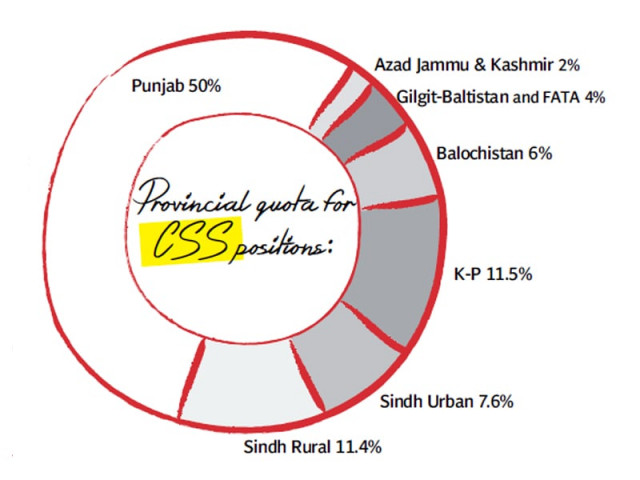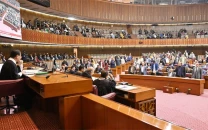CSS examinations: Wheels that run Pakistan coming to a halt
Alarming drop in CSS standards and results over the last decade.

Alarming drop in CSS standards and results over the last decade. DESIGN: MUNIRA ABBAS
Since colonial times, the civil service has retained the prestige that comes with joining the country’s bureaucratic machine, which is why thousands of Pakistanis apply to join the civil service every year.
Worryingly, however, the annual percentage of successful candidates who take the Central Superior Services (CSS) exam has been decreasing, according to the annual reports of the Federal Public Service Commission (FPSC) from 2002 to 2013.
The passing percentage of the candidates in the written examination was 30% in 2002. In 2013 that figure has plummeted to a barely believable 2.09%.
According to the FPSC’s 2012 annual report given to Parliament last week, the government could only fill 240 out of a possible 285 positions that were open to candidates. There were not enough qualified and eligible candidates to fill out the remaining 45 positions, the report said. This is not new either. There were 66 vacancies after the 2010 CSS exam.
The annual reports from 2010 and 2011 compiled by the FPSC have been documenting the trend, but 2013 has hit a new low.
This year, a total number of 15,998 had applied for the CSS. Out of the 11,406 who actually gave the exam, only 238 passed the first phase. Out of total 238, 172 were male and 66 female.
Those who passed the written part of the examination will have to undergo further tests, including a medical examination, a psychological assessment and Viva Voce, an oral examination. An FPSC official predicted that many more candidates may still be disqualified after further tests.
According to the 2012 annual report, 13,071 candidates applied for the CSS exam while 9,063 appeared for it. Only 786 eventually qualified, with a lopsided gender divide, as 604 men qualified, and only 179 women.
Provincial Disparities
There are, of course, systemic reasons for the atrophying results. Provincial disparity, present in almost all human development indices in Pakistan including education, health and income, is also present in the CSS examination process. Over the years, candidates from Sindh, and Karachi in particular have been decreasing, leaving more and more positions vacant.
In 2010 and 2011, there were 35 and 21 unfilled positions from the Urban Sindh quota respectively, as fewer candidates apply for the exam, preferring potentially higher pay in the private sector.
With an already Punjab-heavy quota of 50%, a drop in candidates from Sindh carries a higher potential for disagreement between the provinces. Given that the civil service defines itself as “the wheels on which the engine of the state has to move,” lately it seems like the wheels are coming off.
In order to mitigate the crisis, the FPSC has been conducting a series of career counselling seminars, trying to raise the profile of the civil service, with the aim of increasing the number of applications. Rana Bhagwandas, chairman of the FPSC, hopes for a fresh education policy to complement the FPSC’s effort to broaden recruitment.
Essay writing
24%
passed
out of
9,062
candidates.
31 got
above
60%
marks
Problematic Academic Trends
Observations from 2011 highlighted problematic trends within the examination process, the most apparent of which is the low quality of writing – a factor that has affected performances in all subjects. That is most evident in the result for the essay writing exam: out of 9,062 candidates only 24% passed, out of which only 31 candidates got above 60%. But inferior writing skills have adversely affected results in all subjects.
Second, candidates’ inclination to rote-learn has also compromised their analytical skills, required for effectively every subject in the examination. Ready-made answers have hardly been adequate in answering questions that require serious inquiry, knowledge and analysis. Such exercise was particularly problematic in the South Asian History and Public Administration sections of the exam.
Lastly, English language skills have also been poor across the board, hampering candidates’ ability to answer questions effectively.
In Islamic Studies, the majority of candidates could not attempt the questions regarding Women and Islam, and had failed to adequately consider contemporary issues regarding the veil and secularism in society. According to the report, papers on Islamic history and culture were also mediocre, with only a superficial understanding of the subject demonstrated. The highest percentage attained in Part 1 was 60%. In Islamic jurisprudence, students simply could not grasp the questions being asked.
While students demonstrated greater diligence in their preparation for the International Relations section, the majority of the candidates could not achieve the required standard, the report said.
“Answers were neither proper nor precise,” the report said.
In 2012,
13,071 applied
9,063 appeared for the exam
786 qualified
604 men
179 women
In 2013,
15,998 applied
11,406 appeared for the exam
238 passed
172 male
66 female
In 2010:
66 vacant positions
In 2012:
45 vacant positions
Published in The Express Tribune, December 15th, 2013.



















COMMENTS
Comments are moderated and generally will be posted if they are on-topic and not abusive.
For more information, please see our Comments FAQ